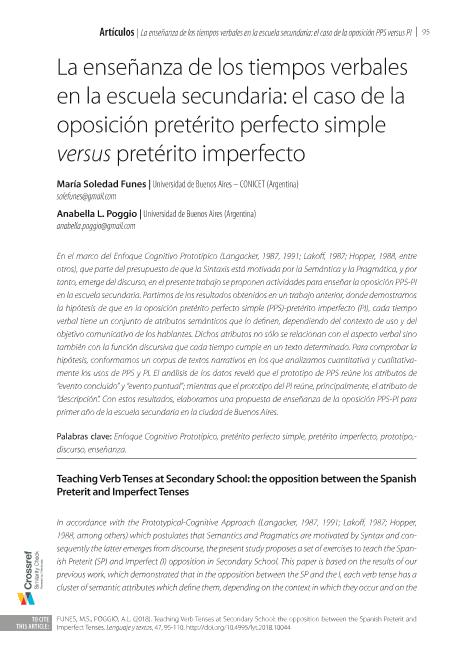Mostrar el registro sencillo del ítem
dc.contributor.author
Funes, María Soledad

dc.contributor.author
Poggio, Anabella L.
dc.date.available
2022-11-07T15:06:49Z
dc.date.issued
2018-06
dc.identifier.citation
Funes, María Soledad; Poggio, Anabella L.; La enseñanza de los tiempos verbales en la escuela secundaria: el caso de la oposición pretérito perfecto simple versus pretérito imperfecto; Universitat Politècnica de València; Lenguaje y Textos; 47; 6-2018; 95-110
dc.identifier.issn
1133-4770
dc.identifier.uri
http://hdl.handle.net/11336/176702
dc.description.abstract
En el marco del Enfoque Cognitivo Prototípico (Langacker, 1987, 1991; Lakoff, 1987; Hopper, 1988, entre otros), que parte del presupuesto de que la Sintaxis está motivada por la Semántica y la Pragmática, y por tanto, emerge del discurso, en el presente trabajo se proponen actividades para enseñar la oposición PPS-PI en la escuela secundaria. Partimos de los resultados obtenidos en un trabajo anterior, donde demostramos la hipótesis de que en la oposición pretérito perfecto simple (PPS)-pretérito imperfecto (PI), cada tiempo verbal tiene un conjunto de atributos semánticos que lo definen, dependiendo del contexto de uso y del objetivo comunicativo de los hablantes. Dichos atributos no sólo se relacionan con el aspecto verbal sino también con la función discursiva que cada tiempo cumple en un texto determinado. Para comprobar la hipótesis, conformamos un corpus de textos narrativos en los que analizamos cuantitativa y cualitativamente los usos de PPS y PI. El análisis de los datos reveló que el prototipo de PPS reúne los atributos de “evento concluido” y “evento puntual”; mientras que el prototipo del PI reúne, principalmente, el atributo de “descripción”. Con estos resultados, elaboramos una propuesta de enseñanza de la oposición PPS-PI para primer año de la escuela secundaria en la ciudad de Buenos Aires.
dc.description.abstract
In accordance with the Prototypical-Cognitive Approach (Langacker, 1987, 1991; Lakoff, 1987; Hopper, 1988, among others) which postulates that Semantics and Pragmatics are motivated by Syntax and consequently the latter emerges from discourse, the present study proposes a set of exercises to teach the Spanish Preterit (SP) and Imperfect (I) opposition in Secondary School. This paper is based on the results of our previous work, which demonstrated that in the opposition between the SP and the I, each verb tense has a cluster of semantic attributes which define them, depending on the context in which they occur and on the speaker’s communicative purpose. These attributes are related not only to the grammatical aspect of the verb but to the discursive function that each tense fulfils in a given text. In order to confirm this hypothesis, a corpus of narrative texts has been compiled, from which the uses of Spanish Preterit and Imperfect have been analysed qualitatively and quantitatively. Data analysis demonstrates that the SP prototype has the attributes of a ‘completed event’ and of a ‘telic event’ whereas the Imperfect prototype has mainly the attribute of ‘description’. On the basis of the results obtained, we have developed a teaching proposal of the SP-I opposition for students of the first year of a secondary school in Buenos Aires, Argentina.
dc.format
application/pdf
dc.language.iso
spa
dc.publisher
Universitat Politècnica de València

dc.rights
info:eu-repo/semantics/openAccess
dc.rights.uri
https://creativecommons.org/licenses/by-nc-nd/2.5/ar/
dc.subject
ENFOQUE COGNITIVO PROTOTÍPICO
dc.subject
PRETÉRITO PERFECTO SIMPLE
dc.subject
PRETÉRITO IMPERFECTO
dc.subject
ENSEÑANZA
dc.subject.classification
Lingüística

dc.subject.classification
Lengua y Literatura

dc.subject.classification
HUMANIDADES

dc.title
La enseñanza de los tiempos verbales en la escuela secundaria: el caso de la oposición pretérito perfecto simple versus pretérito imperfecto
dc.title
Teaching Verb Tenses at Secondary School: the opposition between the Spanish Preterit and Imperfect Tenses
dc.type
info:eu-repo/semantics/article
dc.type
info:ar-repo/semantics/artículo
dc.type
info:eu-repo/semantics/publishedVersion
dc.date.updated
2022-11-07T10:12:16Z
dc.identifier.eissn
2530-0075
dc.journal.number
47
dc.journal.pagination
95-110
dc.journal.pais
España

dc.journal.ciudad
Valencia
dc.description.fil
Fil: Funes, María Soledad. Universidad de Buenos Aires. Facultad de Filosofía y Letras; Argentina. Consejo Nacional de Investigaciones Científicas y Técnicas; Argentina
dc.description.fil
Fil: Poggio, Anabella L.. Universidad de Buenos Aires. Facultad de Filosofía y Letras; Argentina
dc.journal.title
Lenguaje y Textos
dc.relation.alternativeid
info:eu-repo/semantics/altIdentifier/url/https://polipapers.upv.es/index.php/lyt/article/view/10044
dc.relation.alternativeid
info:eu-repo/semantics/altIdentifier/doi/http://dx.doi.org/10.4995/lyt.2018.10044
Archivos asociados
